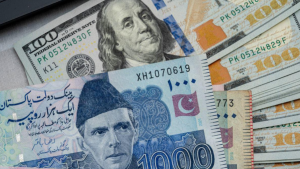[ad_1]
ISLAMABAD: A full-court bench of Supreme Court of Pakistan has announced its verdict in the reserved seats case, her on Friday. The decision follows extensive proceedings on July 9.
In a major legal victory for the Pakistan Tehreek-e-Insaf (PTI), the Supreme Court on Friday accepted Sunni Ittehad Council’s (SIC) plea and ruled that the party is eligible for the allocation of reserved seats.
Justice Mansoor Ali Shah announced the majority 8-5 verdict, nullifying the PHC order.
The court had Tuesday reserved the verdict on the SIC’s petition challenging the Peshawar High Court’s (PHC) decision wherein it had upheld the Election Commission of Pakistan‘s (ECP) order to deny the reserved seats to the SIC — comprising of the PTI-backed independent candidates.
The bench also comprised Justice Syed Mansoor Ali Shah, Justice Muneeb Akhtar, Justice Yahya Afridi, Justice Amin-ud-Din Khan, Justice Jamal Khan Mandokhail, Justice Muhammad Ali Mazhar, Justice Athar Minallah, Justice Syed Hassan Azhar Rizvi, Justice Ayesha Malik, Justice Shahid Waheed, Justice Irfan Saadat Khan and Justice Naeem Akhtar Afghan.
A timeline of reserved seats saga
The reserved seats issue first emerged after over 80 Pakistan Tehreek-e-Insaf (PTI) backed independent candidates emerged victorious in the February 8 elections and subsequently joined the SIC in a bid to claim seats reserved for minorities and women.
The SIC then approached the ECP on February 21 seeking allocation of reserved seats. However, the PTI suffered a setback after the electoral body, citing the party’s failure to submit its list of candidates, denied allocating the reserved seats to the SIC via its 4-1 majority verdict on March 4.
In the verdict, the ECP said it extended the deadline to submit a priority list for the reserved seats of women, and the SIC, before the February 8 polls, did not submit the required list which was “mandatory”.
The electoral body’s verdict cited Article 51(6), saying the article clearly stated the reserved seats would be allocated to the political parties who contested elections and won general seats based on a “proportional representation system”.
While rejecting the plea of SIC, the ECP accepted applications of the opposing parties and decided that the seats in the National Assembly would not remain vacant and be allocated by a proportional representation process of political parties on the basis of seats won by political parties.
The electoral body said the SIC cannot claim the share in the reserved seats for the women “due to non-curable procedural and legal defects and violations of mandatory provisions of the Constitution”.
The party then approached the PHC on March 6, which upheld the electoral body’s decision on the matter in its March 14 ruling.
Subsequently, on April 2, the SIC moved the SC seeking to set aside the PHC verdict and the allocation of 67 women and 11 minority seats in the assemblies.
The allocation of reserved seats holds significance as the PTI-backed independent candidates, who make up the majority of the opposition benches, lost as many as 77 reserved seats in NA and provincial assemblies due to the PHC’s verdict.
It is to be noted that the PHC verdict allowing the allocation of reserved seats to the ruling coalition comprising the Pakistan Muslim League-Nawaz (PML-N), the Pakistan Peoples Party (PPP) and others, led to them securing a two-thirds majority in the National Assembly.
In the National Assembly, the PML-N was allocated 14 seats and the PPP and the Jamiat Ulema-e-Islam-Fazl (JUI-F) were given five and three additional seats, respectively.
The move propelled the PML-N’s number in the lower house to 123, and PPP to 73, whereas the PTI-backed SIC number stood at 82.
In the Khyber Pakhtunkhwa Assembly, the JUI-F was given 10 seats, the PML-N was allocated seven, whereas the Awami National Party got one reserved seat.
In Punjab, the PML-N got 23, the PPP secured two, whereas the Istehkam-e-Pakistan Party (IPP) and the Pakistan Muslim League-Quaid (PML-Q) got one reserved seat each.
Meanwhile, in Sindh Assembly, the PPP and the Muttahida Qaumi Movement were allocated two and one seats, respectively.
A three-member SC bench comprising Justice Mansoor, Justice Minallah and Justice Mazhar, took up the SIC’s plea on June 6 and suspended PHC’s verdict as well as the ECP’s decision on the said issue.
Following the SC’s decision to suspend the ECP order, the coalition lost its two-thirds majority in the lower house.
A 13-member full-court bench, constituted on May 31, then took up the issue and held a total of nine hearings on the crucial matter — the first hearing being conducted on June 3.
The SIC’s plea, however, was opposed by both the federal government and the electoral body.
In its submission to the court via Attorney General of Pakistan (AGP) Mansoor Usman Awan, the government urged the apex court to reject the SIC’s plea stressing that the reserved seats for minorities and women could be given to a political party which contested the polls and won at least one seat besides providing a list of candidates based on the total number of seats it won as per the law.
Meanwhile, the ECP also adopted a somewhat similar argument contending that the party is not eligible to get reserved seats as it did not submit the list of candidates before the January 24 deadline.
Furthermore, the PML-N also submitted its written arguments before the court that the SIC is not entitled to the reserved seats as it neither contested the February 8 polls nor provided the list of candidates.
It also argued that the party didn’t win a single seat, which as per the written submission, was necessary to qualify for the allocation of reserved seats.
“None of the members of SIC contesting for the reserved seats filed their nomination papers let alone with the mandatory requirement of filing them with the list,” it said, adding that since the nomination papers were never filed, the same were never scrutinised and none was held eligible to contest the elections.
[ad_2]
Source link





